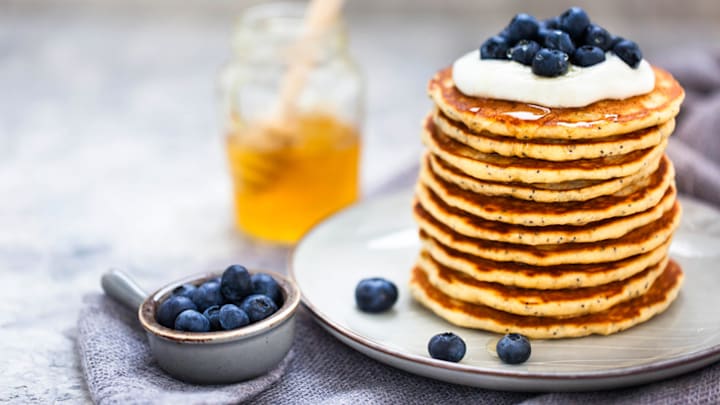If you order pancakes at a diner in the U.S. or Canada, expect a stack of fluffy, circular cakes made from batter, fried to a light golden brown, and served with syrup, fruit, whipped cream, or some other comparably delicious topping.
If you order flapjacks at a diner in the U.S. or Canada, expect the same thing. Flapjack and pancake are generally just synonyms in North America.
In the UK, however, flapjack means something completely different. As Allrecipes explains, an English flapjack is more of a dessert-like granola bar, comprised of rolled oats, butter, and brown sugar (other common ingredients include golden syrup, dried fruit, chocolate, and nuts). The mixture is spread out on a tray, baked in the oven, and usually served in squares or rectangles.
When the word pancake was first cited in writing in the 15th century, it meant basically what it means today: a flat cake made in a pan. Flapjack, with its much less literal definition, has somewhat evolved over time. When it first showed up in the 17th century, some people were using it as an alternative to pancake. For others, however, it referred to “an apple turnover or flat tart,” according to the Oxford English Dictionary. Its modern-day British iteration as a baked oat bar didn’t appear (in print, at least) until the 1930s.
But while the word pancake refers to batter-made, pan-fried cakes in both North America and the U.K., the pancakes themselves have some differences. As The Guardian explains, North American pancake recipes traditionally contain a raising agent (such as baking powder) which results in a thicker, fluffier cake. Since British pancakes lack a raising agent, they’re much flatter—more like crêpes.
Britons even celebrate a holiday devoted to pancakes. For Christians, Shrove Tuesday precedes Ash Wednesday, which kicks off Lent, a 40-day period of fasting leading up to Easter. Historically, that Tuesday was the day for using up eggs, milk, and butter prior to the fast, and pancakes were one of the simplest and most delicious ways to do it. Over the centuries, Pancake Day grew to include pancake races, football matches, and general merriment.
Discover Answers to More Big Questions:
A version of this story was published in 2021; it has been updated for 2024.
